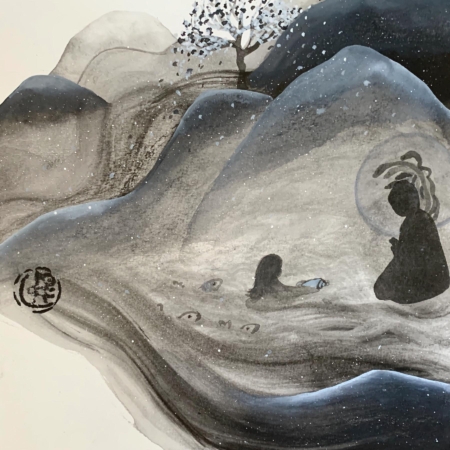There was this old zen master who only spoke pigeon english and he was showing this newly enlightened westerner around the monastery. At every statue of the Buddha he would stop and then bow deeply. The westerner looked on with a certain disdain. After a few such bows the westerner exclaimed:- "I say, isn't that a bit below us now? As for myself I think I would just as soon spit at those statues as bow to them." To which the old zen master said:- "OK. You spit I bow."
Another perspective from an episode in Thomas Merton's life, on his pilgrimage to Asia.
Merton is in an area in Sri Lanka known as Polonnaruwa which contains many statues of the Buddha and his disciples. He records in his Journal:-
The vicar general, shying away from "paganism," hangs back and sits under a tree reading the guidebook. I am able to approach the Buddhas barefoot and undisturbed, my feet in wet grass, wet sand. Then the silence of the extraordinary faces. The great smiles. Huge and yet subtle. Filled with every possibility, questioning nothing, knowing everything, rejecting nothing, the peace not of emotional resignation but of Madhyamika, of sunyata, that has seen through every question without trying to discredit anyone or anything - without refutation - without establishing some other argument. For the doctrinaire, the mind that needs well-established positions, such peace, such silence, can be frightening. I was knocked over with a rush of relief and thankfulness at the obvious clarity of the figures.................looking (at them) I was suddenly, almost forcibly, jerked clean out of the habitual, half-tied vision of things, and an inner clearness, clarity, as if exploding from the rocks themselves, became evident and obvious. The queer evidence of the reclining figure, the smile, the sad smile of Ananda standing with arms folded.....The thing about all this is that there is no puzzle, no problem, and really no "mystery". All problems are resolved and everything is clear, simply because what matters is clear. The rock, all matter, all life, is charged with dharmakaya.....everything is emptiness and everything is compassion.
I once quoted this passage on another Forum and an ardent Christian said:- "You do realise that he was looking at rocks". Myself, I then quoted William Blake, that "we are led to believe a lie when we see with, not thru the eye".
It is all context. We are what we understand.
More words of William Blake from his letters, (from memory)....
To the eyes of a miser a gold coin is far more valuable than the sun and an old bag worn with the use of money of far more divine proportions than grapes hanging on the vine. The tree which brings tears of joy to one man is just a green thing that stands in the way of another. As a man is so shall he see.
As I see it, it is not essentially a matter of levels of attainment, or higher and lower. The zen master Dogen emphasises rather the commitment of each human being. No one can possibly judge another mind/heart, no matter what - or how - they see.
As a commentator on Dogen has explained:-
However lowly one’s symbols and practices as we see in, say, a peasant’s religion, one is entitled to enlightenment if and when one uses them authentically. Here is the egalitarian basis for a claim that Dōgen’s religion is a religion of the people.
 |
| Always accept the flower |


































